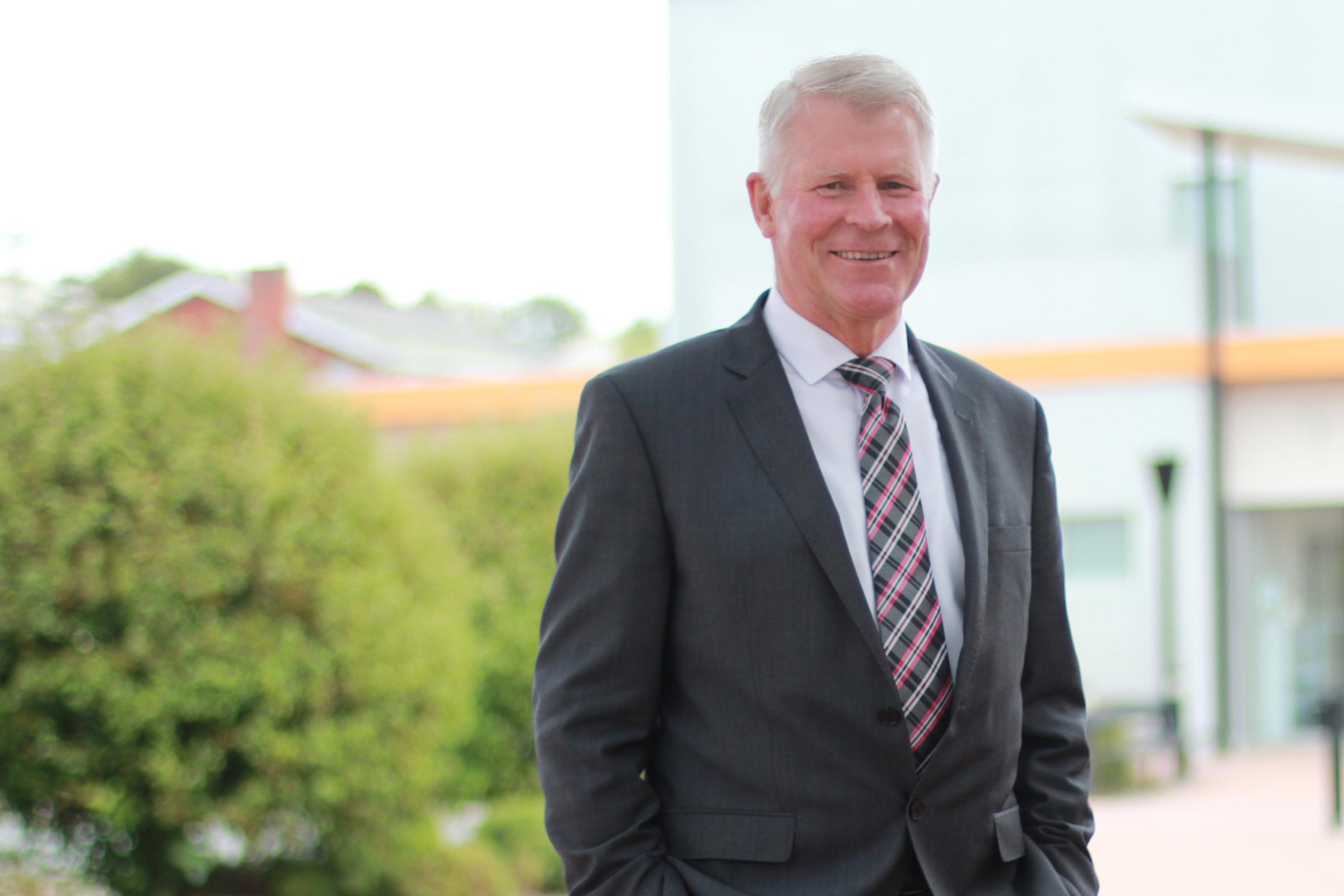From the Principal

When I was a young man, fresh out of school and embarking on my first full time job as an apprentice printing machinist at the Examiner, my parents introduced me to the concept of looking after your cents and the dollars will look after themselves.
This was mainly in relation to tithing to the church. From my handsome weekly wage of $18 and a few cents, (I can’t remember how many cents but let’s say $18.32) I was advised to give $2 to the church. I had to pay $5 board to my parents and the rest was mine to keep. It’s hard to believe but I had spare money left to spend and save.
Why the history? Well I was sharing with our Year 12 leavers at the traditional breakfast we have for them on their last day as students at LCS. I wanted to leave them with a message of thanks and gratitude for the wonderful examples they had been to their peers and the great living testimony they have been to their parents and others who have sown into their lives.
As I reflected on this group of sensational young people, my main message was one of thanks and gratitude. It seems whenever they have been called on to step up, whether it be showing care and concern, doing the right thing, supporting each other, they have been up to the task.
And what is it that makes that happen? No doubt it’s got to do with every one of them doing their bit to help out. Looking after their cents, so to speak. Not necessarily things that stood out as amazing (although some were!) But the little things adding up to something much greater than the sum of all the parts. It made me think of a concept I’d read about called the Aggregation of Marginal Gains.
You know I follow sports a lot and there’s a story about the day things changed for the British cycling team.
They appointed Dave Brailsford as its new performance director. At the time, professional cyclists in Great Britain had endured nearly one hundred years of mediocrity. Since 1908, British riders had won just a single gold medal at the Olympic Games, and they had fared even worse in cycling’s biggest race, the Tour de France. In 110 years, no British cyclist had ever won the event.
Brailsford had been hired to put British Cycling on a new trajectory. What made him different from previous coaches was his relentless commitment to a strategy that he referred to as “the aggregation of marginal gains,” which was the philosophy of searching for a tiny margin of improvement in everything you do. Brailsford said, “The whole principle came from the idea that if you broke down everything you could think of that goes into riding a bike, and then improve it by 1 percent, you will get a significant increase when you put them all together.”
Brailsford and his coaches began by making small adjustments you might expect from a professional cycling team. They redesigned the bike seats to make them more comfortable and rubbed alcohol on the tires for a better grip. They asked riders to wear electrically heated overshorts to maintain ideal muscle temperature while riding and used biofeedback sensors to monitor how each athlete responded to a particular workout. The team tested various fabrics in a wind tunnel and had their outdoor riders switch to indoor racing suits, which proved to be lighter and more aerodynamic.
But they didn’t stop there. Brailsford and his team continued to find 1 percent improvements in overlooked and unexpected areas. They tested different types of massage gels to see which one led to the fastest muscle recovery. They hired a surgeon to teach each rider the best way to wash their hands to reduce the chances of catching a cold. They determined the type of pillow and mattress that led to the best night’s sleep for each rider. They even painted the inside of the team truck white, which helped them spot little bits of dust that would normally slip by unnoticed but could degrade the performance of the finely tuned bikes.
As these and hundreds of other small improvements accumulated, the results came faster than anyone could have imagined. Just five years after Brailsford took over, the British Cycling team dominated the road and track cycling events at the 2008 Olympic Games in Beijing, where they won an astounding 60 percent of the gold medals available. Four years later, when the Olympic Games came to London, the Brits raised the bar as they set nine Olympic records and seven world records.
That same year, Bradley Wiggins became the first British cyclist to win the Tour de France. The next year, his teammate Chris Froome won the race, and he would go on to win again in 2015, 2016, and 2017, giving the British team five Tour de France victories in six years.
During the ten-year span from 2007 to 2017, British cyclists won 178 world championships and 66 Olympic or Paralympic gold medals and captured 5 Tour de France victories in what is widely regarded as the most successful run in cycling history. How does this happen? How does a team of previously ordinary athletes transform into world champions with tiny changes that, at first glance, would seem to make a modest difference at best? Why do small improvements accumulate into such remarkable results, and how can you replicate this approach in your own life?
It is so easy to overestimate the importance of one defining moment and underestimate the value of making small improvements on a daily basis. Too often, we convince ourselves that massive success requires massive action. Whether it is losing weight, building a business, writing a book, winning a championship, or achieving any other goal, we put pressure on ourselves to make some earth-shattering improvement that everyone will talk about.
Meanwhile, improving by 1 percent isn’t particularly notable—sometimes it isn’t even noticeable—but it can be far more meaningful, especially in the long run. The difference a tiny improvement can make over time is astounding. Here’s how the math works out: if you can get 1 percent better each day for one year, you’ll end up thirty-seven times better by the time you’re done. Conversely, if you get 1 percent worse each day for one year, you’ll decline nearly down to zero. What starts as a small win or a minor setback accumulates into something much more.
And I think that’s the key to this group of young men and women who make up our Year 12 for 2022. They have endured the COVID years and came through without losing perspective.
And this principle is one that can be applied to other parts of our lives. The one I’d like to encourage all of us with is devoting time each day to reflect, consider, read, pray, talk with others about how good God is. As a Christian school, we have the privilege and blessing to do this as part of our rhythms and rituals. Let’s encourage each other to spend more time in thanks and praise to God by committing to a practice that involves intentionally finding time to sit, listen and read.
One of the gems I have found is a 366-day devotional called New Morning Mercies by Paul Tripp. But there are many others you could use. Another that I’ve shared with a few students is the Word for Today by Vision Christian Media. You can subscribe to Word for Today for free!
You’ll notice I haven’t yet mentioned the plans God has for us all. That’s because I don’t know them. But I do know He has plans and they are ones to give us hope and a future.
I’m in the process of writing a little word of encouragement to each student and was able to hand these little cards to our Year 11 & Year 12 students last week. In the coming weeks I want to do the same for every child at LCS from Kinder to Year 12. It’s a little 1% thing that I hope God will use to encourage our students.
Parent Forum on Monday 28th November.
I often have conversations with parents and other leaders about how to prepare our young people in a world that is saturated with ideas and concepts that send confusing messages about identity and sex. LCS has invited Melinda Tankard Reist and Daniel Principe to workshop these things with students as part of the Rite Journey at LCS.
We have grabbed the opportunity to provide parents with a forum to hear from an expert in this field. Trying to answer the question - How can we help our children resist harmful messages from media and pop culture and aspire to respectful relationships?
Drawing from current global literature on the subject, as well as the experiences of young people themselves, Melinda will explore with us how the proliferation of sexualised images and messages contributes to a distorted view of bodies, relationships and sxxuality in young people, hampering their healthy physical emotional and social development. How can we address this toxic culture and raise happy, healthy and resilient young people who value their dignity and self-worth and aspire to relationships based on respect and authentic connection? Melinda will provide practical tips and resources to help us achieve this. Daniel will also contribute to this session, sharing his work especially with young men.
I know it’s a busy time of the year and time is precious. I hope the endorsement of this parent will motivate you to come along and participate.
I hesitantly went to Melinda’s talk about Children being sexualised in the media thinking it was going to be a sensationalist attempt to make me feel bad as a parent. During her introduction I realised it was the best 50 steps I took from the car to the auditorium and 90 minutes later, I had quantifiable evidence and authentic strategies to help educate my children against the normalisation of women and girls as sexual objects in the media. As a teacher and parent, I recommend all parents, in fact all people, to attend a talk by Melinda- it will open your eyes and awaken your subconscious. – Heather – parent at Pembroke School

